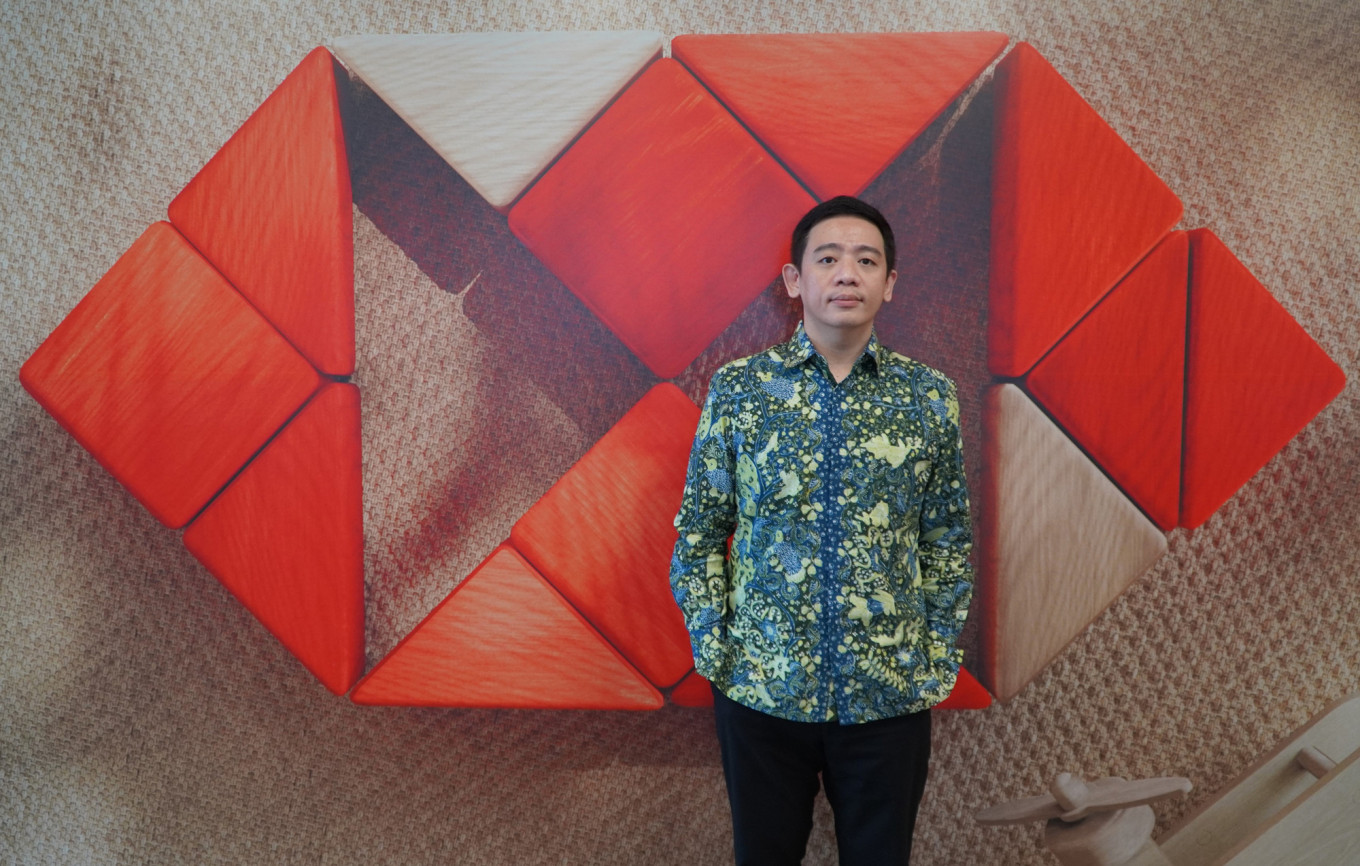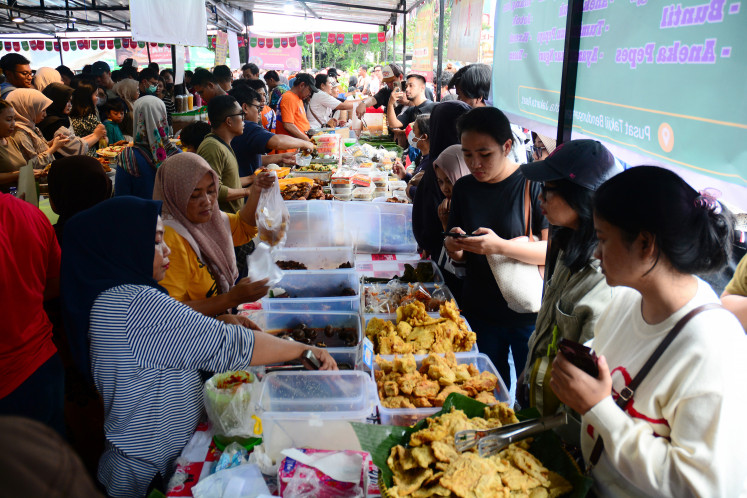Popular Reads
Top Results
Can't find what you're looking for?
View all search resultsPopular Reads
Top Results
Can't find what you're looking for?
View all search resultsHSBC partners with govt to attract investments for economic growth
Change text size
Gift Premium Articles
to Anyone
T
he ongoing development of natural resource-based downstream industries in Indonesia has been a magnet for investors, with a leading international bank pledging to further facilitate foreign direct investment (FDI) into the country.
In a road map of the downstream industry that covers 21 potential commodities, including critical minerals for batteries, prepared by the Investment Ministry/Investment Coordinating Board (BKPM), Indonesia needs US$545.3 billion in investment until 2040 to develop downstream industries across eight priority sectors, including minerals and forestry.
Charles Kho, country head of Multinationals & International Subsidiary Banking PT Bank HSBC Indonesia (“HSBC”) viewed the government’s decision to develop the downstream industry as important step to realize Indonesia’s ambition to be in the world’s top-five largest economy by 2045 and, at the same time, to reach its net-zero emission target by 2060 or earlier, underpinned by the development of its eco-friendly electronic vehicle (EV) ecosystem.
“Indonesia cannot only rely on the demographic bonus and needs to start leveraging in building the downstream industries based on its very rich natural resources,” Kho opined.
“We have seen this as a positive movement as we can clearly see the progress in terms of its FDI [foreign direct investment] performance, another record high in 2023 at $47 billion, an approx. 14 percent increase, and the government again puts an aggressive target in 2024 despite it being a political year,” he said.
According to him, Indonesia is one of the economies where the next decade’s growth will likely be higher than the previous decade, as the economy climbs up the manufacturing value chain, from ores and processed metals to EVs, which offers tremendous potential to attract FDIs
Kho justified the government’s consistency in its implementing policy to ban nickel ore exports to help Indonesia move up the value chain. The ban on nickel ore exports has triggered domestic investment in smelters and the EV value chain. “Along with this will come opportunities to build an integrated mining, refining and supply ecosystem with intended investments in the metals and EV space estimated at $75 billion,” he said.
The government’s focus on high-value activities has started to bear fruit. “We have seen a move up in the manufacturing value chain, and this trend is likely to continue. Ever since the ban of certain raw ores, the economy has doubled down on expanding its refining capacity, resulting in a sharp increase in the exports of metal products like iron and steel.
“We’ve also seen growth of FDI in Indonesia's downstream nickel processing industry by major players such as Huayou, CNGR and CATL, Indonesia is set to increase its production capacity up to 4.5 million tonnes per annum within the next five years,” he noted.
HSBC’s Global Research, Indonesia Advantages report estimated that additional $30 billion of investment intentions in processed metals over the next five years and the rise in the EV ecosystem with $45 billion of investment intention could add to Indonesia's potential growth, pushing it up from 5.3 percent now to 5.8 percent by 2028.
Deeply rooted in the market
As an international bank with 140 years of experience in Indonesia and strong international connectivity which spans globally over 60 countries, HSBC has served as a financial gateway between East and West, which connects Indonesia to the world and the world to Indonesia. In the context of downstream industry development, HSBC has been playing a pivotal role in attracting FDI to Indonesia.
“As the leading international bank in Indonesia and Best International Bank by Asiamoney, we are deeply rooted in the market and this year we are celebrating 140 years of operations in this vibrant market. Our purpose remains to opening up a world of opportunity and support the growth of Indonesia as well as our clients,” Kho remarked.
According to him, the downstream industry provides abundant opportunities and considers strategic to Indonesia. “We have always been a partner of Indonesia through various transactions with the government, state-owned enterprises (SOEs), local corporates, and also with our vast portfolios of multinational clients.”
“EVs are also important and strategic when it comes to Indonesia’s ambition to be net zero by 2060 or earlier,” he remarked.
He said developing the downstream industry required collaboration between public and private financing. “But more importantly, we need to invite high quality FDI into the country where those investors will bring significant capital, technology, and create job opportunity for the Indonesian people,” he remarked.
HSBC has been in partnership with the Ministry of Investment/BKPM and its overseas branch in nine strategic locations globally to promote Indonesia’s growth opportunities, including the downstream industry and EV ecosystem and to invite investments to the country.
Kho revealed the great appetite for investment in Indonesia shown by investors from South Korea and Hong Kong during his corridor trip to the two countries recently, confirming Indonesia’s position as a key investment destination and being considered strategic for international expansion market following positive investment climate and reforms taking place.
South Korea investors continued to target the nickel and EV ecosystem while HK corporates viewed Indonesia as an answer toward their production/supply chain diversification strategy, Kho revealed.
“This finding is also consistent with our latest Global Connection survey where Indonesia is a leading target for international businesses looking to invest in ASEAN,” he noted.
“Uniquely being the international bank that offers universal banking services across corporate banking, retail banking and investment banking onshore, we can better serve the needs of multinationals either new investors to the country or existing investors that would like to scale up,” he said.
“This is attractive from the investors’ perspective as they, indeed, need a banking partner that can help them to expand easily from one market to another. Simply put, they need a globally connected bank with in-country tailored solutions.” From pre-construction and construction to post-construction, HSBC offered complete banking propositions spanning across financing, global markets, transaction management, trade services and many more; ensuring our clients’ financial and transactional banking needs are catered seamlessly, he remarked. Worth to note that in the recent 2024 Euromoney Trade Finance Survey, HSBC Indonesia has been voted as “Market Leader”, which supplements the Global and Regional recognition that HSBC Group received as top bank for trade finance
“Investors also look for a banking partner that can help them to transition to net-zero and digitize their globally connected banking operations. We have built strong reputation in the market and we have leading propositions to support such ambition” he said..
Giving examples of HSBC’s success story regarding its support to attracting investments, Kho revealed the bank’s role in acting as a Joint Bookrunner and International Selling Agent for the $610 million IPO on the IDX showcased the bank's prowess in attracting international investors to emerging markets. By leveraging its global network and expertise, HSBC played a key role in bringing visibility to the Indonesian battery company and opening avenues for investment opportunities. The successful IPO not only bolstered the company's financial standing but also highlighted HSBC's ability to navigate complex financial transactions with ease.
In addition to its success with the IPO, HSBC further solidified its position as a leading financial institution by spearheading the funding for Southeast Asia's first EV battery cell plant in Karawang. As a mandated lead arranger and lender for the $711 million loan, The construction of plant is set to revolutionize the electric vehicle market by producing lithium-ion battery cells with an annual capacity of 10-gigawatts.
The entry of Korean Motor Group Companies in Karawang marks a significant milestone in Indonesia's journey towards becoming a hub for electric vehicle manufacturing. With an annual production capacity of 10-gigawatts worth of lithium-ion battery cells, this plant has the potential to power 150,000 electric vehicles, paving the way for a greener future.
By partnering with innovative companies and supporting transformative projects like the Indonesian battery company IPO and EV battery cell plant construction, HSBC has positioned itself as a key player in driving investment opportunities in emerging markets. The bank's expertise in attracting international investors, coupled with its commitment to sustainable finance, has enabled it to make significant contributions to advancing industries like electric vehicles and renewable energy.
Universal banking experience
“We have track records in originating and executing landmark transactions in the country, including supporting the government, SOEs, local corporates, and our international clients. This means we can deliver the right transaction structure for the right clients while adhering to the relevant rules and regulations where we operate.”
“We always look at our relationship holistically and strategically. It goes beyond a single transaction but it covers the overall banking requirements, how we support not only their financing aspect but also bringing best-in-class digital banking solutions to make banking processes easy for our clients; and also how we incorporate ESG instruments in supporting our clients to decarbonize,” Kho said, referring to environmental, sustainability and government principles.
“What we offer is a unique universal banking experience so our clients can rely on HSBC to serve all their banking requirements locally and globally,” he noted.
He cited a global consumer goods leader, Polygroup, an on-demand same day delivery platform Lalamove, and New York-based multinational food, snack and beverage company PepsiCo as other exemplary evidences demonstrating HSBC’s commitment to supporting investment/ FDI into Indonesia in various sectors.
With Indonesia’s huge potential in building its natural resource-based downstream industry and the massive impact of achieving Indonesia’s Golden Vision 2045, the country is currently in a transformative era that will ensure that the country breaks through the middle-income trap and become a developed or advanced nation, Kho said.
“This is also highlighted during our recent Podcast HSBC Talks Business with Pak Nurul Ichwan, investment promotion deputy minister at the Ministry of Investment/BKPM,” Kho disclosed.
He reaffirmed that HSBC’s focus remained on supporting the growth of Indonesia and its clients. “We believe that the government will continue seizing this momentum by crafting robust incentives and policies to attract more investments to the country.”
“We need to ensure as we develop the downstream industry in Indonesia, it will need to be developed alongside our ESG and SDGs [Sustainable Development Goals] objectives, as more often than not they come hand-in-hand. This means we need to think more holistically and strategically,” he said.
“As for HSBC, we have been the partner of the country to attract foreign investment and trade flows. We have the expertise and will continue fostering as well as expanding the existing collaboration,” Kho concluded.
Source: HSBC











